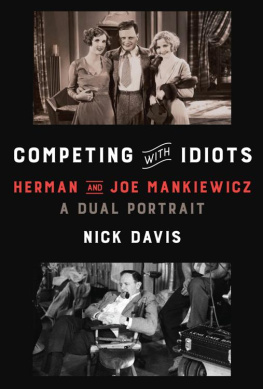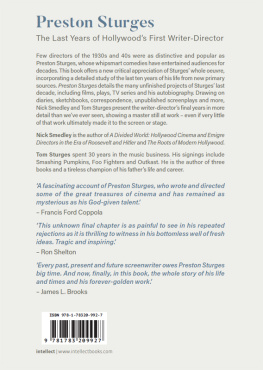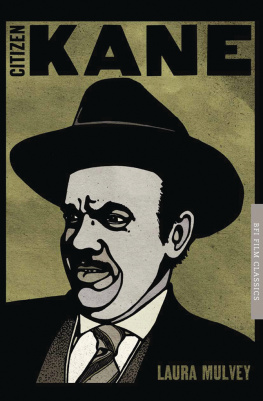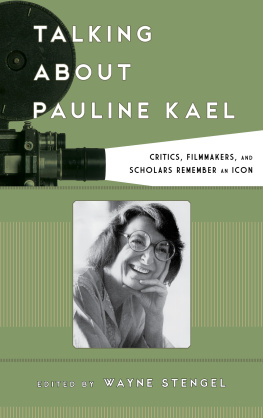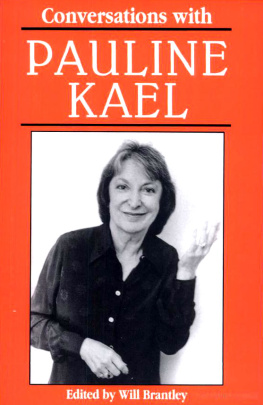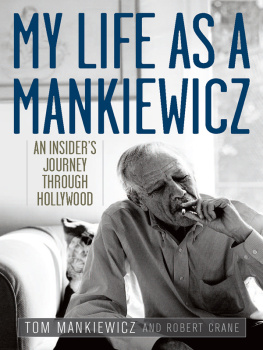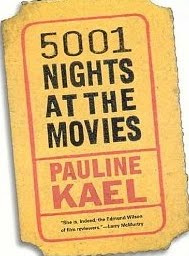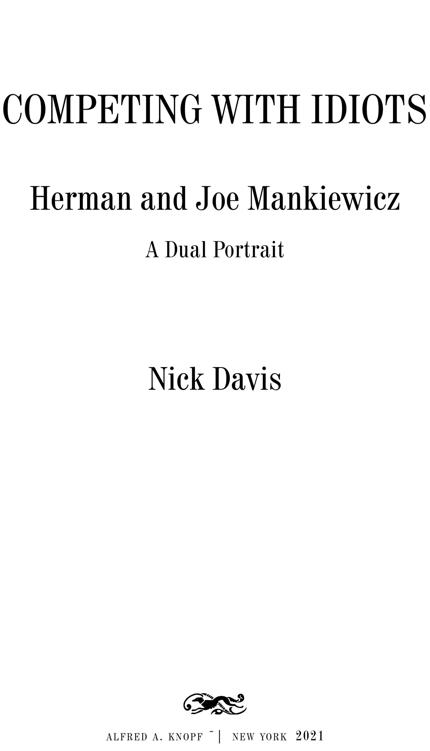published by alfred a. knopf
All rights reserved. Published in the United States by Alfred A. Knopf, a division of Penguin Random House LLC, New York, and distributed in Canada by Penguin Random House Canada Limited, Toronto.
Knopf, Borzoi Books, and the colophon are registered trademarks of Penguin Random House LLC.
Names: Davis, Nick, [date] author.
Title: Competing with idiots : Herman and Joe Mankiewicz, a dual portrait / Nick Davis.
Description: First edition. | New York : Alfred A. Knopf, 2021. Includes bibliographical references and index. |
Identifiers: LCCN 2020052645 (print) | LCCN 2020052646 (ebook) | ISBN 9781400041831 (hardcover) | ISBN 9780593319703 (ebook)
Subjects: LCSH: Mankiewicz, Joseph L. | Mankiewicz, Herman J. (Herman Jacob), 18971953. | Motion picture producers and directorsUnited StatesBiography. | ScreenwritersUnited StatesBiography. | Motion picturesUnited StatesHistory20th century.
Classification: LCC PN1998.2 .D378 2021 (print) | LCC PN1998.2 (ebook) | DDC 791.4302/33092273 [B]dc23
PROLOGUE
Its only when you stop knowing everything that you can start to know anything at all.
It was 1988. I was twenty-three years old and walking through Central Park with my dad. We were coming from the French Consulate, it was a lovely spring day, and Great Uncle Joe had suddenly turned into a Mystery.
All my life, Joe Mankiewicz had played a distant second fiddle. In no way could his work or life measure up to that of his big brother Herman, my maternal grandfather, the beloved legendary Hollywood figure who, while drinking himself into a memorable early grave, scattering brilliant one-liners like chicken feed for everyone to peck at, had also written some of the best screenplays in Hollywoods golden age, cowriting with Orson Welles what was quite clearly the greatest movie of all time, Citizen Kane. My grandfathers legend was secure, at least in my mind.
The sense Id inherited about his younger brother Joe, on the other hand, was that first of all, Joe wasnt nearly as good a writer as Herman. To begin with, my understanding was that Joes 1963 epic, Cleopatra, starring Elizabeth Taylor and Richard Burton, was as big a bomb as the Hollywood system ever churned out, and that basically everything else Joe had ever done, with the grudging exception of All About Eve, was almost embarrassingly overwritten, whereas nothing in Hermans oeuvre, including of course ThePride of the Yankees (highlighted by the immortal line Lou! Lou! Lou! Gehrig! Gehrig! Gehrig!) was anything other than eminently quotable. But more than that, there was the notion that Joe simply wasnt a very good guy; it was part of the air I breathed that Joe Mankiewicz was a man who had misplaced his decency at birth and never even bothered to look for it.
But now this afternoon at the French consulate was changing everything. In the first place, that the entire nation of France had honored Joe with something called the Chevalier de la Lgion dHonneur, struck me as totally amazing. How could a man whod made two or three good movies (I was dimly aware that Joe should get credit for a couple other movies Id never much bothered with, like ALetter to Three Wives and Suddenly, Last Summer) and one historically rotten epic, actually be awarded a national honor by an entire country? I knew of Frances bewildering devotion to Jerry Lewis, so I recognized the nation had a questionable barometer when it came to matters of cinematic tasteah, youthbut were the French standards such that they would venerate the man whod made The Barefoot Contessa, (which Id once passed while flipping channels, cringed at the florid and ham-handed dialogue, and moved scornfully past)? As I considered the simple ribbon and medal that the French ambassador had pinned to Joes lapel that afternoon, the highest honor the nation bestowed and one rarely given to foreigners, I started to sense that maybe it wasnt entirely fair to have reflexively condemned the man to the outer ring of movie directors, relishing the category in which Andrew Sarris had lumped Joes work: Less than Meets the Eye.
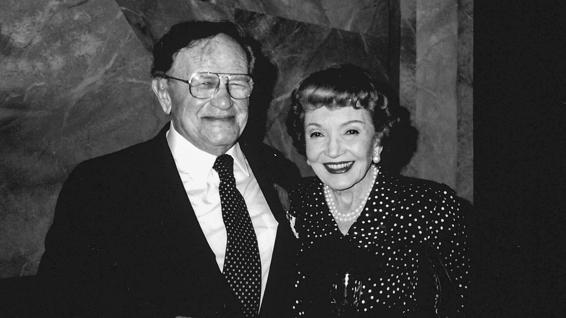
Joe and Claudette Colbert at the French Consulate at the ceremony where Joe was honored with the Chevalier de la Lgion dHonneur, 1988
But in the second place, and more important, was Joe himself. This kind, unassuming, seemingly modest older man who had greeted me so warmly that afternoon, who twinkled with delight as hed introduced me to Claudette Colbert, the man who had spoken so wittily and self-deprecatingly when the French ambassador asked him to say a few words, shaking his head and smiling down at the ornate yellow carpet when others praised his workhe looked gentle and decent, and quite a lot like my beloved Uncle Frank. Frank was Hermans younger son, my mothers brother and one of my favorite relativesfunny and smart and humane, and in my imagination probably the closest thing to what Herman himself must have been like. But that afternoon it was Joe, pudgy and wrinkled like a chewed-up dog toy, who seemed to emanate nothing but gentleness and humanity. He had grasped my hand warmly when we parted, and patted my hand with his sandpapery fingers, a gesture of such intimacy that it made me miss, completely and utterly, my mother, who had died when I was nine. He was my flesh and blood, this Great Uncle Joe, and he was lovely and warm and real.
So why had we never seen this man growing up? Why, when he lived less than an hour from our home in Greenwich Village, was this only the third or fourth time in my life I could remember seeing him, and the first since Moms funeral more than a decade before? None of it made any sense.
Dad took a deep, theatrical sigh when I asked him these questions, the kind a certain kind of man loves to take when hes about to lay some serious shit on his son. Then he told me a story about my mom.
Dad had always been careful not to overwhelm me with stories about her. He knew I missed her, knew Id loved her, but I think he also felt that since shed died when I was so young, my own memories of her were fragile treasures, things that might break or, worse, alter and be replaced, if too many other peoples memories were larded on top of my own. So Dad and I had settled into a comfortable respect for my memory of my mother, and stories about her were told sparingly. But this one, he said, could no longer be avoided, especially since I was asking about Joe. It was something, Dad told me, that he was sure Mom would have wanted me to know if she had lived.
In the fall of 1958, Johanna Mankiewicz had just graduated from Wellesley, and she had come to live in New York City. She could have decided to go back to California, where she was from, but Im not sure it even occurred to her. She had inherited from Herman a general distaste for most things California had to offer, and besides, New York was where Joe lived.

